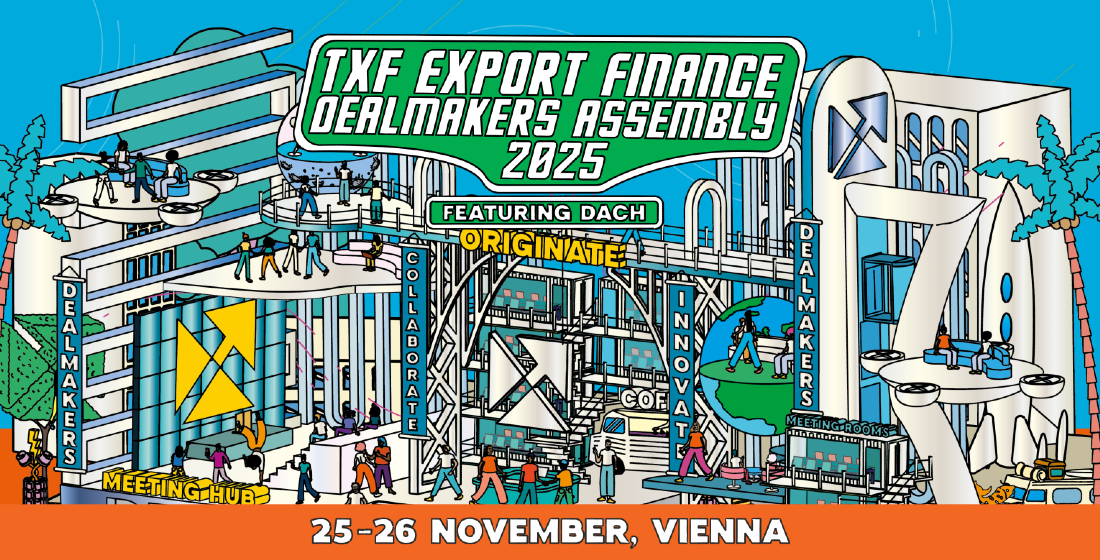New BU Climate Working Group rolls up its sleeves
Leah Gilbert Morris, Director of International and ECA Relations at Export Development Canada (EDC) and Chair of the BU Climate Working Group on behalf of EDC, discusses the ambitions of the new group with TXF and explains how it will deliver tangible action.

Launched on 17 March, Berne Union’s new multidisciplinary Climate Working Group (CWG) wants to accelerate climate action in the export credit, trade finance and political risk insurance industries by fostering innovation and alignment around low-carbon transition. The CWG brings together experts from a range of disciplines across climate, ESG, sustainability, risk underwriting, and policy, representing ECAs, multilateral investment insurers, development institutions, commercial banks and private insurance companies.
TXF: What's the chief ambition of the CWG and how are you going to coordinate the range of disciplines of the group beyond solely ECA involvement?
 Leah Gilbert MorrisLeah Gilbert Morris (LGM): When you look at the composition of the BU Climate Working Group (CWG), you’ll see that a lot of thought was given to geographic diversity and the experience of the working group members’ institutions in ESG and climate in particular, and also the nature of the organisations.
Leah Gilbert MorrisLeah Gilbert Morris (LGM): When you look at the composition of the BU Climate Working Group (CWG), you’ll see that a lot of thought was given to geographic diversity and the experience of the working group members’ institutions in ESG and climate in particular, and also the nature of the organisations.
We have a quantum of ECAs, and also private insurers, banks, DFIs and the multilaterals represented. That diverse representation is important because it lends a lot of global connectivity and diverse perspective.
We’re aiming for this group to be as transparent as possible. And you can already see that on the Berne Union website with the materials that have been shared to date. That speaks to the CWG’s intent and the Berne Union’s intent for this group to contribute to the broader global dialogue on climate.
But we also want to the inverse to be true. We want to benefit from the global dialogue. We're not out to recreate the wheel. We want to take advantage of the vast connectivity that the CWG membership brings. We have direct connectivity and representation within the Export Finance for Future (E3F) coalition, within Equator Principles, within the ICC and its Sustainability Working Group, and within the multilaterals and the development bank community, including the Finance in Common Coalition. We have OECD practitioners represented in this group and we have Glasgow Financial Alliance for Net Zero (GFANZ) and a forthcoming ECA workstream within that. That's amazing connectivity and gives all kinds of benefits to this group achieving its objectives.
TXF: Does the working group have any lobbying ambition at all in terms of trying to change policy or, for instance, reform the OECD Consensus?
LGM: I wouldn't say that there's a lobbying ambition expressly. It’s very important that this group starts to share knowledge in a more purposeful way, to start to drive greater awareness of innovations that are happening in the climate space and really start to advance practices across the Berne Union membership. When you look at the Berne Union membership, most, if not all, have introduced some form of sustainability commitments and some have made great strides on climate. And you see that reflected in the working group's composition.
But others aren't there yet and they're still grappling with the fundamentals and there is the level playing field issue and we need to start to turn up the pace at which Berne Union members are identifying new solutions and opportunities to solve for climate and to try to level the playing field.
TXF: What tangible deliverables that, for instance, EDC has made on the environment can be adapted for other players in the market?
LGM: EDC’s experience in the climate space is one reason it was asked to step into a leading role in the CWG. There's a gradient of different commitments and practices across Berne Union members. We might have members who are wrestling with the first steps on stress testing and TCFD reporting and portfolio decarbonisation. Then we have others who are more advanced in those areas, but who are still grappling with how to evolve their practices to take the next steps such as with stress testing, setting science-based targets and innovating new incentives-based approaches within transactions.
I talked about the level playing field and policy coherence as a priority for many members. There are a lot of global commitments out there that would benefit from more consistent implementation approaches, including the recent Joint Statement on International Public Support for the Clean Energy Transition that came out of COP26. The working group would like to bring focus to how our organisations make a quick pivot to meet climate commitments without disadvantaging customers.
That's going to be the perpetual challenge of ECAs, in particular, to be there for our exporters while making these strides and going lockstep together to maintain a level playing field.
There's also a lot of interest in the group in terms of exploring innovation – anything from new transition-focused products and financial incentives to innovations within transactions. That could be looking at how to revisit, rethink or re-examine risk appetite, climate risk assessments, or biodiversity and nature-based solutions, as examples.
That’s a flavour of some of the areas where CWG members have raised their hands and said we've got either some interesting things going on here or these are big questions we need to tackle.
TXF: And you are specifically sticking to climate rather than broader ESG?
LGM: Yes. The Berne Union is deeply invested in ESG issues. Climate in particular is a central topic and the new working group is a reflection of the Berne Union’s commitment to tackling one of the biggest challenges out there that are faced by all of its members today.
TXF: To what extent is the current crisis in Ukraine and the increasing need for energy security taking away focus from energy sustainability? How will the CWG help drive the message further as, speaking to exporters, some are seeing the pedal being taken off a bit on climate in recent weeks?
LGM: It’s not a parallel necessarily but there was a lot of concern in the early days that the pandemic would detract from ESG issues and would divert funding and capacity and commitments away from the progress that was being made. But in fact, the inverse was true and, if anything, it escalated the focus on ESG with the notion of building back better coming out of the pandemic.
The invasion is tragic. And it highlights the fact that climate and energy security are pervasive, relentless global issues. I expect these issues to be topical in terms of the upcoming Berne Union spring meetings and the upcoming meetings of the CWG. While no specific explorations have been made yet by the CWG, you ask a very pertinent question. As an example, when you look at the suite of policy commitments that are relevant to the CWG and broader Berne Union membership, there is certainly scope to examine critical considerations in relation to energy security in relation to the common global climate commitments we share. Hopefully this work only serves to keep building the momentum of members’ and exporters’ climate action.
TXF: With your very diverse membership with very different backgrounds. How will you find common action to match common purpose?
LGM: There’s so much happening in the global discourse on climate across the financial sector, no matter what corner of the financial sector you play in. The climate crisis is a crisis and requires fast action: the CWG doesn’t have time to start at square one, especially where others are already setting examples from which we can learn. To the extent that the diverse membership of CWG members can borrow from what's already being innovated out there in this sector, all the better. That’s the advantage of diverse membership. Equally, to the extent that CWG members and broader Berne Union membership is innovating and progressing on different facets, all the better to share that as well to the global community.
TXF: What’s first and what’s next?
LGM: We have three workstreams focused on innovation, best practices and policy coherence, which is how we have grouped the priorities or the areas of, greatest interest for the CWG members. Right now, we're building momentum within each of those workstreams and formulating specific plans to take specific work forward. For instance, we will introduce an innovation series where we start to specifically and publicly profile emerging product and transaction innovations. We’ll also introduce a video library to share more ‘how to’ technical guidance and experience with low-carbon transition. And we’ll be undertaking some analysis to assess the state of play of approaches to implement various global policy commitments.
We have had four meetings and all of the governance and the setup is in place. And now we're really at the stage of, “Okay, let's roll up our sleeves and start to dig in!”
This interview also appears in Berne Union BUlletin





